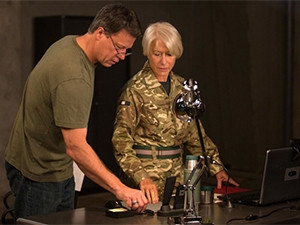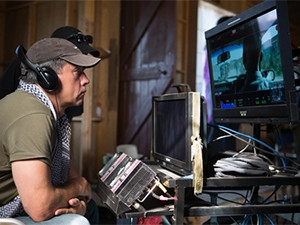
If you watched Eye In The Sky, the tense drone warfare thriller starring Helen Mirren and the late Alan Rickman, you were watching a very South African production. It was filmed entirely in the Western Cape and was directed by South Africa's Gavin Hood, who also directed Tsotsi and X-Men Origins: Wolverine.
When a US-controlled drone missile strikes a terrorist hotbed in Nairobi, it's a Cape Town film set we're looking at. Of course, a drone didn't really strike anything, and didn't even fly here, because the Civil Aviation Authority refused permission for the crew to use our airspace, so everything was conjured up through spectacular visual effects. Beaufort West airfield doubled for a Nevada Desert Air Force base, while a film set built to look like Soweto for The Long Walk To Freedom was converted into modern-day Nairobi.
Eye in the Sky is one of more than 40 films being screened at the Indie Karoo Film Festival in July, where Hood will attend a question and answer session. The festival in the usually quiet town of Prince Albert is now in its second year, and its founder, filmmaker Johnny Breedt, has big ambitions. "We aim to become one of the best film festivals in Africa," he says.
An unknown art
Since technology plays a starring role in the film industry, the festival includes master classes in editing and production skills run by the small hi-tech companies LabSpace and The Color Space.
LabSpace owner Michael Brennan has worked on more than 15 feature films and got involved with training when he saw a lack of understanding for film editing software. He was Africa's first Final Cut Studio Master trainer and the first Apple mentor for Final Cut Pro X. He now runs train-the-trainer courses for Apple and heads a team of Apple- and Adobe-certified instructors.
At the film fest, he'll teach video editing, including importing footage, selecting, trimming and deleting clips, adding audio, titles and effects and exporting the finished project using Premier Pro software.
We aim to become one of the best film festivals in Africa.
Johnny Breedt, Indie Karoo Film Festival founder
Another mentor will be Regardt Voges, who owns The Color Space in Cape Town. Voges has worked in post-production for more than a decade and specialises in Da Vinci Resolve software.
Colour grading can have a huge impact, he says. "I can guarantee that every single film you see has been heavily colour graded. Just like everything you hear has gone through an audio engineer's desk, everything you see has gone through a colour engineer's desk to make it look spot-on. It's an unknown art."
Workshops

Film cameras today are excellent, but the way they shoot still leaves a lot of work to do in post-production, Voges says. "You want to do as much in front of the camera as you possibly can, but if you leave a beautiful image exactly as the camera sees it, some of the shadows may be too dark or the light too bright," he says. "It also becomes a story-telling tool - a shot could be bright and sharp, but it might work better as a sunset or in late afternoon light, and with colour correction, you can colour a different story."
Some really good software is available today for free, when only five years ago, it cost millions of rands, Voges says. The business model has changed, so Blackmagic, which develops DaVinci Resolve software, gives it away in the hope that users will buy its hardware like cameras and colour control desks.
"A lot of the software is free, so anybody can start playing with it, but it's difficult if you don't understand the thinking behind the processes, and people sometimes can't make sense of it," Voges says. "So we're offering workshops to show what you can do and start them on a journey."
Share